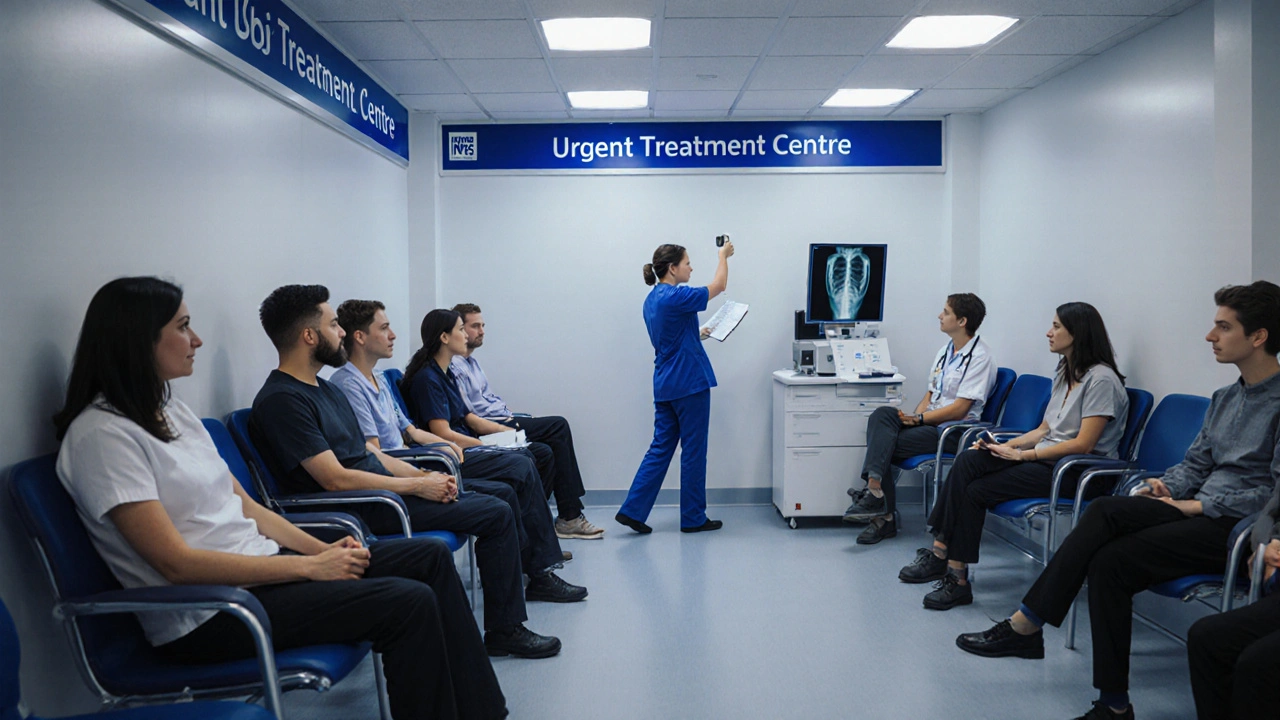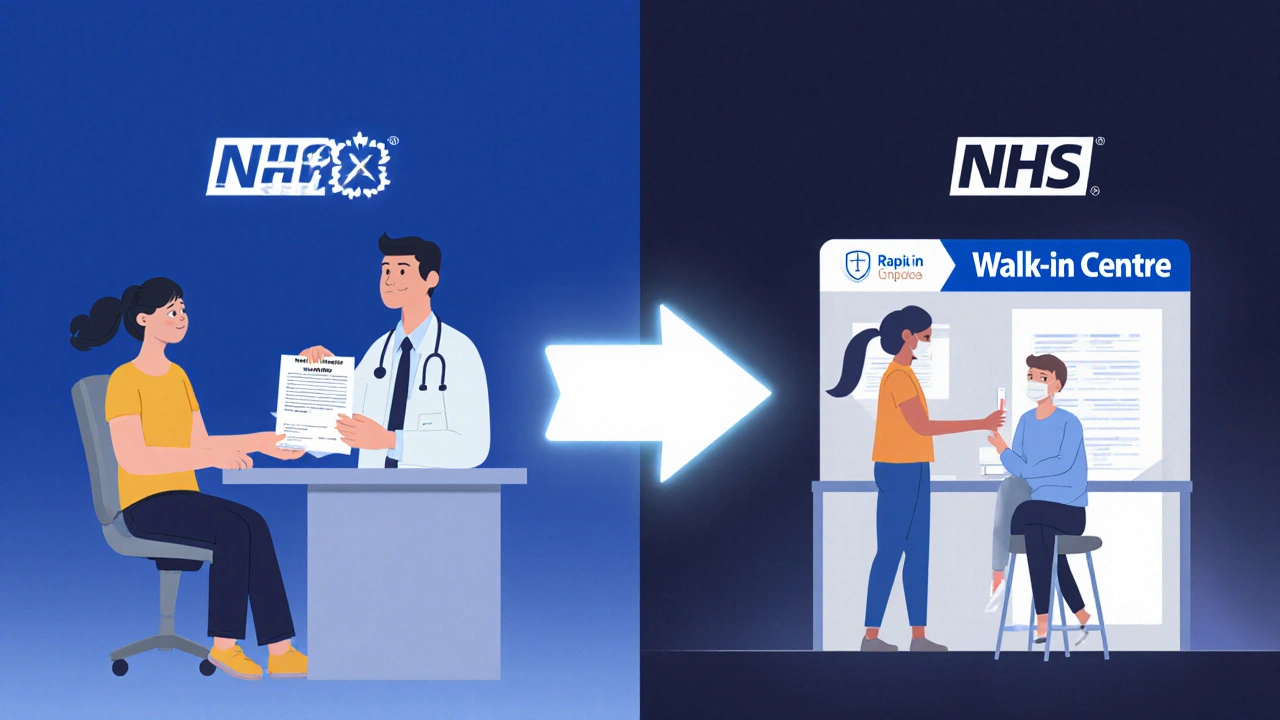
If you're a student in the UK and you feel under the weather, you probably wonder: should you book a GP appointment or just walk into a walk-in centre? It’s not just about convenience-it’s about getting the right care at the right time. Many students end up waiting days for a GP slot, only to find out they could’ve been seen the same day at a walk-in centre. Others show up at a walk-in centre for something that needs ongoing management, and end up sent away with no follow-up. Knowing the difference saves time, stress, and sometimes even your health.
What a GP actually does for students
Your GP, or general practitioner, is your main point of contact for long-term health. They keep your medical history, track chronic conditions like asthma or diabetes, and manage prescriptions. For students, this means they’re the ones who’ll handle things like mental health support, birth control, long-term medication refills, or follow-ups after hospital visits.
GP surgeries in the UK operate on appointments. Most universities have on-campus GP services or are linked to local practices. Booking a slot can take anywhere from the same day to two weeks, depending on demand. If you’ve got a recurring issue-like anxiety, acne, or a persistent cough-you need a GP. They’ll notice patterns, order blood tests, refer you to specialists, and coordinate your care over time.
But if you’re sick with a cold, a sore throat, or a minor injury? A GP isn’t the fastest option. And that’s where walk-in centres come in.
What a walk-in centre actually does
Walk-in centres, also called urgent treatment centres (UTCs), are designed for sudden, non-life-threatening problems. Think: sprained ankles, ear infections, urinary tract infections, rashes, or high fevers. They don’t need appointments. You show up, get seen by a nurse or doctor, and usually leave within an hour.
These centres are staffed by advanced nurse practitioners and GPs who work shifts. They can prescribe antibiotics, give injections, do basic wound care, and even order X-rays or rapid tests. They’re open longer hours than GP surgeries-often from 8am to 8pm, seven days a week, including bank holidays.
But here’s the catch: they don’t keep your medical records. If you’ve had the same issue twice in three months, they won’t know unless you tell them. They can’t manage long-term conditions. And if your problem needs ongoing care, they’ll tell you to register with a GP.
When to choose your GP
Go to your GP if:
- You need a prescription refill for a long-term condition (like antidepressants or birth control)
- You’re dealing with anxiety, depression, or other mental health concerns
- You have a persistent symptom that hasn’t improved in over a week (like a cough, fatigue, or unexplained weight loss)
- You need a medical certificate for missed classes or exams
- You’re due for a sexual health check-up or STI screening
- You’ve had a recent hospital discharge and need follow-up care
Students with long-term conditions like epilepsy, diabetes, or IBS should always keep their GP updated. Even if you’re only in the UK for a term, register with a local practice. Most GP surgeries accept temporary registrations for students.
Don’t wait until you’re in crisis to find a GP. Register as soon as you arrive. It takes less than 15 minutes online or in person. Your university’s student union can help you find one nearby.

When to go to a walk-in centre
Head to a walk-in centre if:
- You suddenly feel feverish with chills and body aches
- You’ve twisted your ankle playing football
- You have a painful ear infection or sore throat with difficulty swallowing
- You’ve developed a rash that’s spreading or itching badly
- You have a minor burn or cut that won’t stop bleeding
- You need a rapid flu or strep test and can’t wait for a GP appointment
Walk-in centres are perfect for when you’re sick and need help now-but you’re not in danger. If you’re having chest pain, trouble breathing, or losing consciousness, go straight to A&E. Walk-in centres aren’t for emergencies.
Most walk-in centres in the UK are part of the NHS and free for anyone living in the UK, including international students with a valid visa and health surcharge payment. You don’t need to be registered with a GP to use them.
What you can’t get at either place
Neither your GP nor a walk-in centre will give you:
- Emergency surgery or trauma care (go to A&E)
- Specialist referrals without a proper assessment (you’ll need your GP for that)
- Long-term mental health therapy (GP can refer you, but wait times can be long)
- Prescriptions for controlled drugs like strong painkillers without a full review
- Medical certificates for non-medical reasons (like skipping a party)
Some students try to use walk-in centres to get painkillers for hangovers or stress headaches. That’s not what they’re for. Staff are trained to spot misuse, and repeated requests can lead to being refused service.
How to find the right service near you
Use the NHS website or app to find services. Type in your postcode and filter for:
- GP surgeries - for ongoing care
- Urgent Treatment Centres - for same-day minor issues
- A&E - for life-threatening emergencies
Many universities also have 24/7 student health lines. Call them if you’re unsure. They’ll tell you whether to go to a walk-in centre, book a GP, or head to A&E.
Apps like NHS 111 are also useful. Answer a few questions, and they’ll direct you to the right service. It’s free, available 24/7, and often faster than calling your GP.

What international students need to know
If you’re studying in the UK on a student visa, you’ve already paid the Immigration Health Surcharge (IHS). That means you’re entitled to free NHS care-same as UK residents. You can register with a GP and use walk-in centres without extra cost.
Don’t assume your home country’s insurance covers you here. Most don’t. And don’t delay registering with a GP just because you think you’ll only be here for a term. Even short-term students can register as temporary patients. It’s your right.
Keep your NHS number handy. You’ll get it after registering. If you lose it, your GP surgery can look it up.
Common student mistakes and how to avoid them
Here’s what goes wrong-and how to fix it:
- Mistake: Waiting until you’re miserable to book a GP. Fix: Register on day one. Even if you’re healthy, get your records set up.
- Mistake: Going to a walk-in centre for a recurring issue. Fix: If you’ve had the same problem twice, book a GP. They’ll track it.
- Mistake: Thinking walk-in centres are for mental health crises. Fix: Call Student Minds or your university’s counselling service. Walk-in centres can’t help with anxiety attacks.
- Mistake: Using A&E for non-emergencies. Fix: A&E is for heart attacks, broken bones, severe bleeding. Not sore throats.
- Mistake: Not knowing your NHS number. Fix: Write it down. Save it in your phone. You’ll need it every time you visit.
Students who know the system get care faster. Those who don’t end up waiting, getting misdirected, or skipping treatment altogether.
Bottom line: Match the problem to the service
Think of it this way:
- GP = your health team - for ongoing care, prescriptions, mental health, and prevention.
- Walk-in centre = urgent care - for sudden, minor problems when you need help today.
- A&E = emergency - only for life-threatening issues.
Don’t overthink it. If you’re unsure, call NHS 111. They’ll tell you where to go. And if you’re ever in doubt, err on the side of caution. Your health isn’t something to gamble with.
Register with a GP. Know where your nearest walk-in centre is. Save NHS 111 in your phone. That’s all you need to navigate the UK’s healthcare system as a student-no confusion, no delays, no stress.
Can I go to a walk-in centre without being registered with a GP?
Yes. Walk-in centres (urgent treatment centres) are open to anyone in the UK, regardless of GP registration. International students with a valid visa and paid Immigration Health Surcharge can use them for free. You don’t need an appointment or your NHS number to walk in, though having your NHS number speeds things up.
How long do I wait at a walk-in centre?
Wait times vary. Most patients are seen within 30 to 60 minutes. During busy hours (evenings and weekends), waits can stretch to 90 minutes. If you’re not in pain or danger, it’s still faster than waiting days for a GP appointment. You can check real-time wait times on the NHS website for your local centre.
Can a walk-in centre prescribe antibiotics?
Yes. Nurse practitioners and GPs at walk-in centres can prescribe antibiotics for infections like strep throat, UTIs, ear infections, and sinusitis. They follow NHS guidelines and won’t give antibiotics for viral illnesses like colds or flu. If you need a repeat prescription, you’ll need to see your GP.
Do I need to pay for a GP appointment as a student?
No. All NHS services, including GP appointments, are free for anyone legally resident in the UK. International students who’ve paid the Immigration Health Surcharge (IHS) as part of their visa are entitled to the same free care as UK citizens. You won’t be charged for consultations, prescriptions (unless you’re exempt), or referrals.
What if I need mental health support?
Your GP is the best place to start for ongoing mental health support. They can refer you to counselling or specialist services. Walk-in centres can offer brief advice or crisis signposting, but they don’t provide therapy. Most universities also have free, confidential student counselling services-often with same-day slots. Don’t wait for a GP if you’re in crisis; call Student Minds or your uni’s wellbeing team immediately.
Can I register with a GP near my university if I live at home?
Yes. You can register as a temporary patient at a GP near your university if you’re studying away from home. Most surgeries allow this for students who spend most of the term in that area. You can also register at your home GP and use walk-in centres near campus. Just make sure your home GP has your updated contact details.